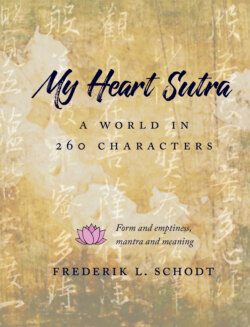Читать книгу My Heart Sutra - Frederik L. Schodt - Страница 14
На сайте Литреса книга снята с продажи.
LISTENING TO THE MANTRA
ОглавлениеIn today’s world, without leaving the safety of your armchair, you can listen to monks around the world hypnotically chanting the Heart Sutra. On YouTube, you can listen to it in various European languages and in Asian languages such as Tibetan, Nepali, Indian, Korean, Vietnamese, Japanese, and both Cantonese and Mandarin Chinese. Sometimes, if the words in the translation have a nice meter to them, the sutra is also shown performed as music by popular singers. Given the linguistic and cultural barriers and the millennia during which the sutra has been transmitted, one of the most fascinating aspects of the chanted version is the similarities in the sounds of the mantra portion. Laborious textual comparison of texts and of rhymes in poems can (possibly) approximate ancient pronunciations of what was once written in India, in Sanskrit, but no one can ever know exactly how the mantra was originally pronounced. Nonetheless, when vocalized in different languages, it is usually recognizable, even if the rest of the sutra is not.
Oddly, the modern Mandarin Chinese pronunciation of the mantra seems to have diverged the most, for the first syllables—the gaté gaté or gyatei gyatei part (rendered in Sino-Chinese characters as 羯諦羯諦)—are often pronounced jiédì jiédì. Some divergence is to be anticipated, since in much of East Asia the Chinese hanzi, or ideograms, do not always have a single, fixed pronunciation; they really represent more of a mental concept than a single sound. People chanting a written Chinese version of the Heart Sutra are thus liable to pronounce it with the sounds they associate with the ideograms, and given the number of wildly different dialects in Chinese these pronunciations may also diverge wildly. But why the modern Mandarin version of the mantra, in particular, should be such an outlier long baffled me, because the Cantonese pronunciation of the mantra adheres fairly closely to that of other languages. The most cogent theory I have heard (in Cantonese-speaking Hong Kong) is that Cantonese is a far older form of Chinese, and Mandarin—at least as a unifying national language—is relatively new, dating back only to the early twentieth century.12
